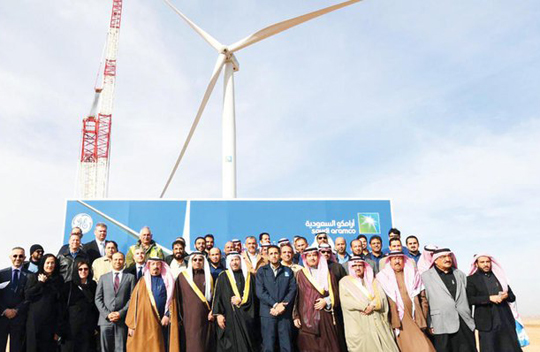Riyadh, Jan 20: Saudi Arabia, expecting to diversify energy sources in line with plans established under Vision 2030, officially entered the wind power age with the commissioning of its first utility-scale wind turbine by Aramco and GE.

The Kingdom marked the commissioning of its first wind energy turbine by providing electricity to its bulk plant facility in Turaif in northwestern Saudi Arabia on Tuesday. The launch of the first wind energy turbine, developed in partnership with GE, marks a milestone in Saudi Aramco’s plan to realize the national renewable energy target defined in the Saudi Vision 2030.
Dr. Majed Abdullah Al-Hedayan, a legal consultant specializing in foreign investment, told Arab News that “the commissioning of this first wind energy turbine is significant as it marks the start of something new in the energy sector in the Kingdom and very much in line with Saudi Vision 2030 that has set an initial target of generating 9.5 gigawatts of renewable energy.”
He added: “It also assumes significance as it came in the week that Khalid Al-Falih, minister of energy, industry and mineral resources, announced that the Kingdom will shortly launch its renewable energy program, a new engine of growth in wind and solar sectors.”
Nevertheless, it will be another alternative to reduce the energy costs and will encourage more investment projects in near future, he added.
Abdullah Inayat, co-founder and media relations director of W7 Communications, told Arab News that “the successful commissioning of the first utility scale wind power turbine is a welcome step toward reliance on renewable energy which is part of Vision 2030 plan.
“Moreover, this successful demonstration highlights the viability of deploying wind power in the Kingdom to diversify energy sources and to meet an increase in demand,” he said.
Abdulkarim Al-Ghamdi, Saudi Aramco’s executive head for power systems, said in a statement that “Saudi Aramco is actively promoting the reduction of energy intensity across the Kingdom by advocating responsible policies, awareness and energy innovation.”
The new wind turbine will generate 2.75 megawatts of power at its peak, enough to power around 250 Saudi households, and it will also reduce the burning of diesel for power generation by 18,600 barrels of oil equivalent per year.
The new initiative for renewable energy will also help reduce the Kingdom’s greenhouse gas emissions and will contribute to global climate action outlined in the Paris climate agreement.






Comments
Add new comment